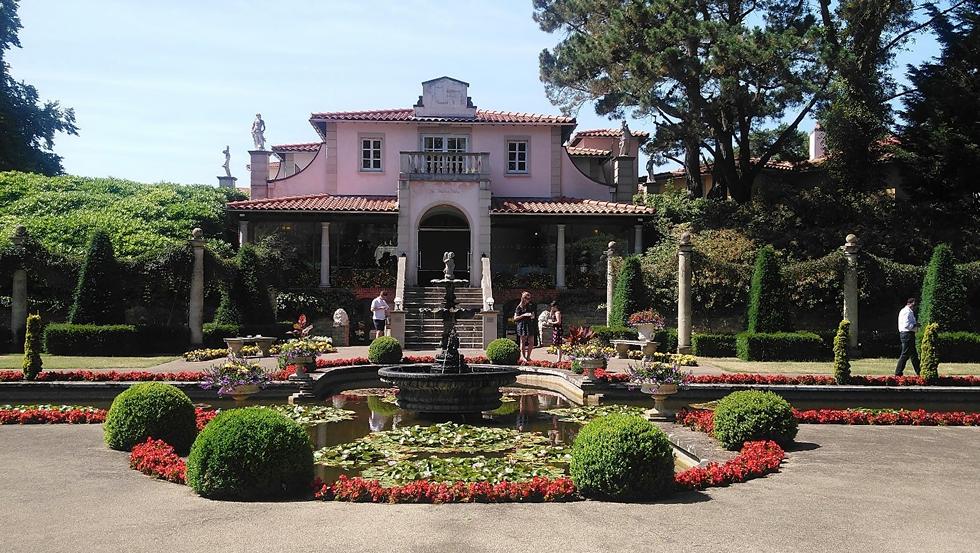
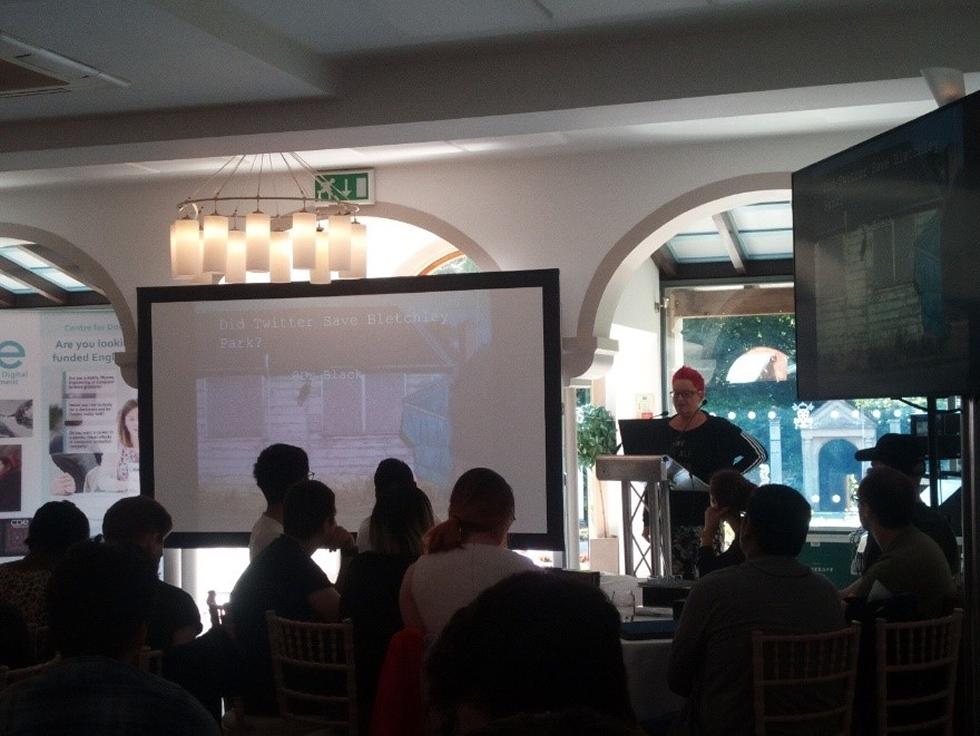
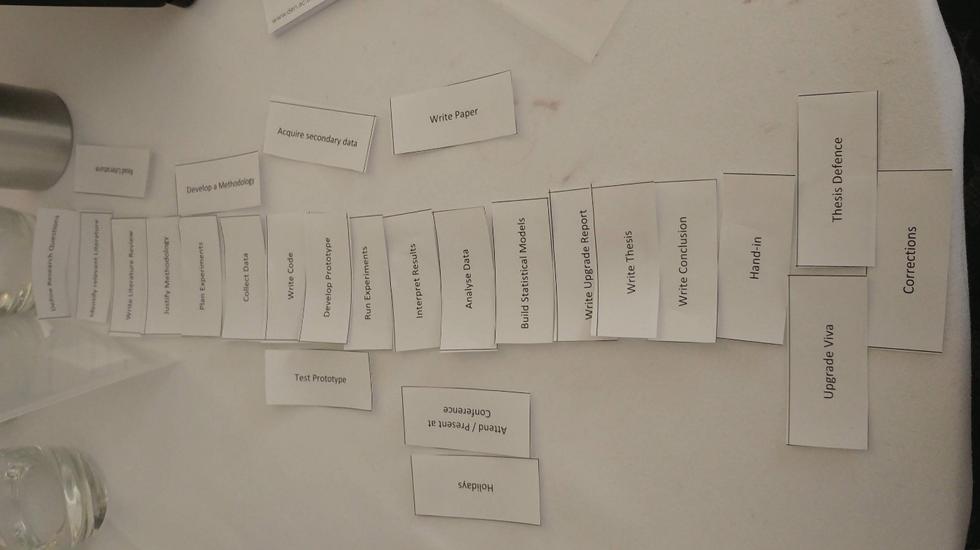
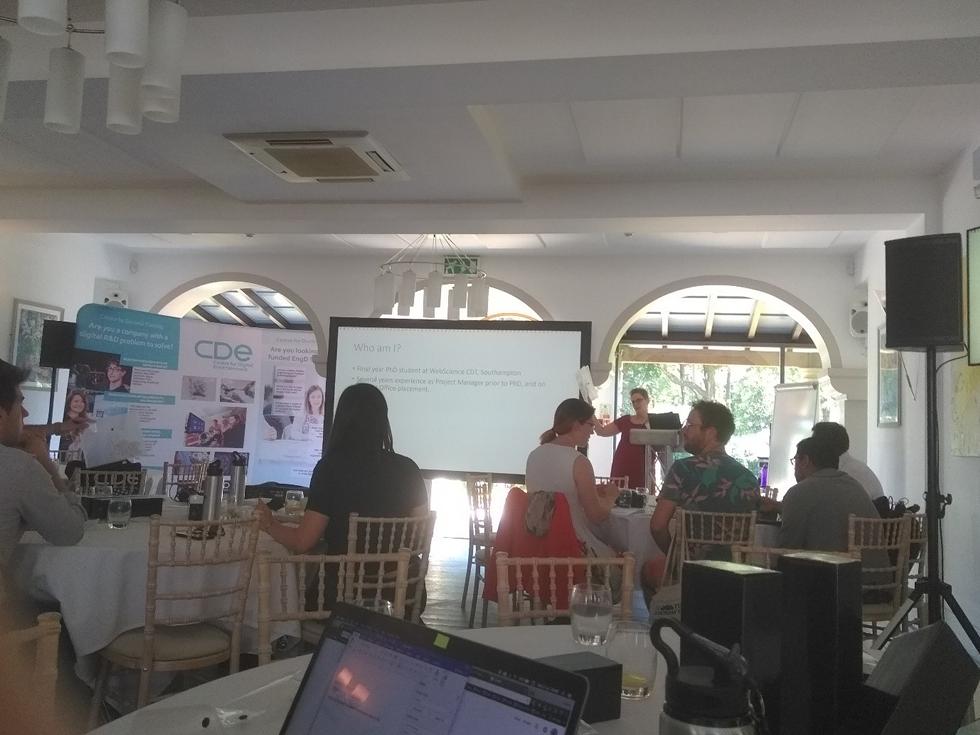
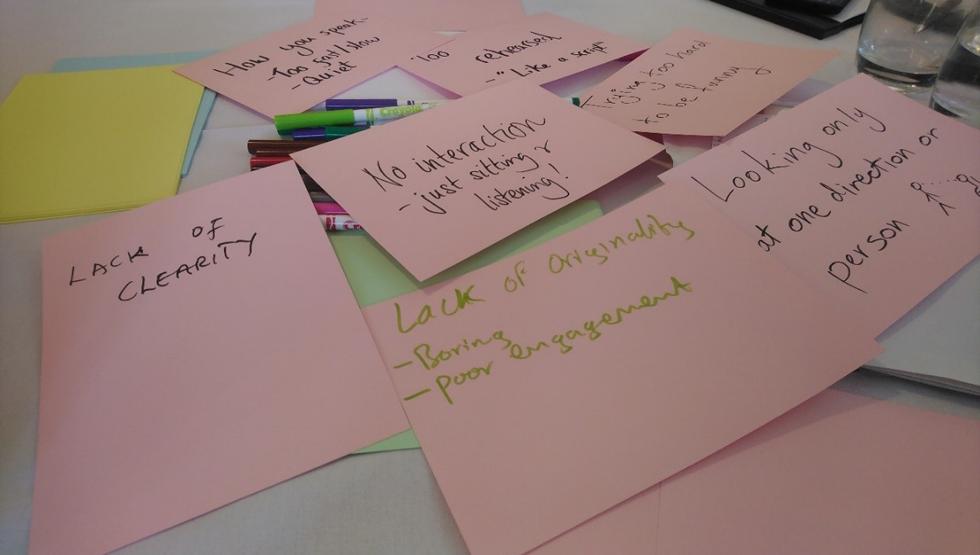
The summer school was opened by two keynote speakers. Dr Sue Black answer the question ‘Did Twitter save Bletchley Park?’ And it turns out: Yes it did!
Dr White took the participants on a tour through her CV, speaking about how she had to drop out of school, had children, and then decided that education was the only way for her to earn enough to sustain her family. As a young woman in a male dominated field, she founded the ‘BCS Women’ network so the ‘women in tech’ could help elevate each other. She has campaigned for many things, including women in tech and tech education for women from disadvantaged backgrounds. When she heard about the women who worked at Bletchley Park in WWII (about 8,000 of the 10,000 people working there were female!), she attempted to raise their profile. And found in the process that Bletchley Park was running out of money. So she spent the next three years campaigning to keep the site open and acquire sufficient funds to maintain it and complete necessary renovation – supported through her network on twitter, and, amongst others, Stephen Fry. Of course, she was successful, and Bletchley Park now has ample funding and is renovating the site – which is well worth a visit!
Dr White then moved on to receive an OBE for services to technology, and dropped her academic career in favour of more campaigning and charity work, for example with the techmums project, that aims to educate mothers to improve the lives of their children.
The second keynote was given by Kish Hirani, CTO of Terra Virtua, and founder of BAME in Games. His talk was interesting in its setup: He used slido.com to first ask some questions about the audience: Where are you from, what country do you associate with? Unfortunately the bad wifi connection made it impossible to finish with the questions ‘How old are you, and what gender do you identify as?’ This would have been interesting to look at though. Following these introductions, and a brief overview of his background, he asked the audience to both ask and rate questions on the same platform. Some pre-defined questions around his industry experience and work around virtual reality were ranked highest, and thus the audience heard about his work with IBM, and how VR can influence users’ experiences. He also advised anyone ever presenting about Blockchain to not use the word ‘Bitcoin!’
Unfortunately the one question our group was very interested in – about his work for BAME and diversity in the games industry – was too controversial to be picked up. Despite that, the talk have interesting insight into the games and VR industry, which was certainly valuable for those in the audience who are less social-sciency-inclined.
This workshop was fantastic, with a lot of audience participation and really thought provoking. Dr Gallagher spoke about how we talk about our research, frequently in small snapshots, and can often misrepresent our work because we aren’t clear enough. We have all been to a bad presentation, or left a discussion with someone wondering what their research is actually about. This is crucial that we get this right, as we spend a lot of our time talking about our work at networking events like this Summer School. In groups, we thought about what makes good and bad research, filling in these coloured cards to collect our ideas as a group.
Dr Gallagher asked us to write down the four key ingredients to our story, using a jigsaw analogy.
This task was a useful way of looking at your research, and gives a good structure for any presentation, which you are planning to give, or a poster that you will design. I’ve never really been given these tools that encourage you to think about your research, and how it will be presented to the audience.
Dr Gallagher spoke about language asking – who is in front of me, what words will they know or not know? In our groups we considered who our audience would be, what would their background be and what would the look like? We wrote some of these down and did a little drawing so that we could put a realistic face on our audience. In thinking about what sort of person would listen to me talk about my research, it made me think more about the language I would use and how the content of my presentation might change. We got the chance the end of the session to use some of our newly learned skills and present our work to our group. I got some much out of this session, and hope to meet Jamie again as I feel like I need more training to improve my presentation skills even more!
Gefion’s workshop for Monday’s session spring-boarded off her strong background in project management to produce a session geared around helping PhD students not only plan their PhD, but stay on track with a plan that can be routinely kept and implemented. Emphasis is placed highly on realistic goals; we are human beings after all! Gefion demonstrates this point early in the workshop during a Gantt chart showcase which overviews her PhD. She explained that due to constant setbacks and delays on one aspect of her project, it was time to admit defeat and cut it out entirely. It’s important to remember that these things will happen, and in fact, adversity is something to bear in mind throughout, which is touched on more later in the session.
Why though? - Why do we even need project management for a PhD? Couldn’t you just steam ahead with your research and writing? Well given the multitude of facets involved in PhD projects, the variation between disciplines and sheer number of things that can go wrong, it’s very useful – and indeed, wise – to plan accordingly for all aspects. Gefion tells us that for a lot of the parts of a PhD there’s simply no way to accurately know the time, the cost or consequences for some things (such as interviews or experiments going wrong), but we can at least try to estimate these things. A guestimate plan is better than no plan at all!
What Could Possibly Go Wrong? - Things can and do go wrong during PhDs, despite our best efforts. Gefion’s advice for dealing with adversity is to be as pessimistic as possible. Computer failure? Take it into account, and plan backups. Ethics forms taking too long? Apply earlier! Fire destroyed your computer science department? Well, there’s not a whole lot you can do, but you could at least keep your equipment out of harm’s way where possible, get yourself insured, and have a copy of your important data. The point here is that you should prepare for the worst, just in case it happens. You won’t regret overcompensating in your planning, but you will regret not doing it.
Things to Make and Do - We did several activities centred around project management, the first being a card sorting exercise where aspects of the PhD are written on a small piece of paper, and these are then sorted into things you will do, things you might do, and things that won’t apply to you. For instance, maybe your project doesn’t involve qualitative data, but does involve quantitative data. Arrange these in a coherent way which make a loose timeline structure. This, while not being comprehensive, is a great start for visualising the steps you’ll take over the next few years. You may find it impossible to order, or that some parts repeat or don’t fit in any one place, but this is fine as you’ve now identified that you’ll need to fit them in differently
One thing heavily emphasised is holidays. You need to factor in you to your research! You’re not a robot, and given that most PhD students follow a full time work schedule this will eventually take its toll if you don’t consider your own mental and physical health. Rest is important, so schedule real holidays where you take a genuine break from your work.
Tools of the Trade - There are a number of tools Gefion mentions that are very helpful in managing your PhD. These vary from online tools, such as Trello, Wunderlist and Asana, to desktop based tools like Microsoft’s Outlook Tasks and OneNote. If you prefer, you can just use a pen and paper, or perhaps a whiteboard. The important thing here is to choose what works for you. A premium subscription software suite might be great for some people, but perhaps you would work better with a nice set of stationary and a notepad. Try all sorts of methods, but again, it’s important that you use what works for you, and use something rather than nothing. Remember, making notes, reminders and lists reduces your mental load, and will promote a reduction of stress from trying to remember your schedule and PhD affairs. Gamification is also a very useful tool to not only organise your tasks but promote wellbeing through self-reward. The ways of doing this vary, but it could be that you cross off a task, tick a box, or even use software where, for example, you can earn XP for finishing off your tasks in an RPG style way. Once you’ve ticked or crossed off your tasks, reward yourself! Gamification gives you a nice visual way to see your achievements happening and to recognise your hard work, which helps promote healthy work-reward balance.
Money Matters - Money has a very serious impact on your research when budgeting goes wrong. It can mean a lack of equipment and not attending conferences amongst other things. Every project – and side project – has a financial implication in some way, so it’s important to know where you stand with regards to research grants, scholarships and other means of funding, as hardly any PhD is “free”. Always remember too that there may be outgoings that you never considered you would have to have funding for. Gefion gives an example of this in her project as she has written both German and English sections of her thesis, so things like this may require translation or proofreading services.
The single best tool to budget your expenses is the humble spreadsheet, and during the session Gefion talks us through her 15-years-in-the-making super-spreadsheet which she uses throughout every aspect of her PhD, from daily planning to budgeting and beyond. Your spreadsheet doesn’t need to be complicated of course, it is simply a matter of keeping track of outgoings, ingoings, and those instances of money which haven’t quite been accounted for, such as missed payments. Stay on track, and you reduce stress in the future when you need to remember what happened to that workshop payment in March, or whether you got refunded for that train ticket last year.
So, What Are You Going to Do? - The session concludes with a suggestion that we check in with our partners from our tables in either the next few days, weeks or months, to see if we’ve managed to keep on track using the techniques introduced in the session. Will we fill in the super-spreadsheet, or use a more traditional pen and paper approach? It is emphasised that the most important way to stick to these organisational practices is routine, with a daily check in taking as little as 5 minutes a day once your personal infrastructure is set up.
We’ve been left with an incredible set of skills under our belt to better cope with our workload and manage our time, as well as do our personal admin related to our PhD. Gefion’s session has been tremendously valuable and I would urge any PhD student, or even research staff, to attend future sessions.